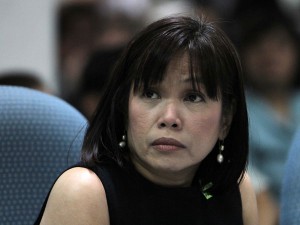PH pushes for more IMF reforms
The Philippines and other emerging markets are clamoring for a bigger voice in the International Monetary Fund (IMF), given the growing importance and influence of the developing world in the global economy.
The Intergovernmental Group of 24 on International Monetary Affairs and Development, otherwise known as the G-24, lamented the IMF’s failure to pass key reforms in the last three years that would have given emerging markets a bigger voice in the Fund.
“Larger quotas would provide greater representation and voice in the Fund,” the Philippines’ National Treasurer Rosalia de Leon told the Inquirer. De Leon was the country’s representative to the G-24 meeting that took place at the sidelines of the IMF’s annual meeting last week.
De Leon said the IMF needs to recognize “the increasing contribution and growing importance [of emerging market nations] to the global economy.”
In a communiqué published at the weekend, the G-24 pointed out that the IMF missed its self-imposed Oct. 2012 deadline for the implementation of new quotas for countries and other governance reforms, which were agreed upon in 2010.
The G-24 added that the IMF also failed to agree on a new quota formula by the review deadline of January 2013. A country’s quota is the money it contributes to the IMF. The size of a country’s quota determines the amount of influence it wields in the fund though the weight of its votes.
“Both are critical to the Fund’s legitimacy, credibility and effectiveness. We urge countries to fulfill their commitment of implementing the 2010 governance reform expeditiously,” the G-24 communiqué said.
“We strongly believe that the fundamental goal of quota and governance reform must be to enhance the voice and representation of emerging markets, including the poor, as well as vulnerable, fragile and small-, low- and middle-income countries,” the G-24 said.
On Dec. 15, 2010, the Board of Governors, the Fund’s highest decision-making body, approved a package of far-reaching reforms of the multilateral lending agency’s quotas and governance.
Once the reform package is approved by member countries and implemented, it will result in a 100-percent increase in total quotas for emerging market nations and a major realignment of representation to better reflect the changing relative weights of the IMF members in the global economy.
However, the amendments will include changes in the Fund’s Articles of Agreement, which requires the acceptance by big economies that presently hold 85 percent of the total voting power.
The failed 2010 agreement was part of the 14th General Review of Quotas done by the IMF. The G-24 said it hoped that the reforms would be implemented by the 15th General Review, which will start in January 2014.
Other Asian members of the G-24 apart from the Philippines are India, Iran, Lebanon, Pakistan, Sri Lanka and Syria. In Latin America, G-24 members are Argentina, Brazil, Colombia, Guatemala, Mexico, Peru, Trinidad and Tobago, and Venezuela.
